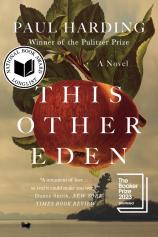This Other Eden
Review
This Other Eden
Paul Harding’s prose is so evocative that it’s tempting to write an entire review of his latest book focusing on nothing but that. But what is equally remarkable about THIS OTHER EDEN --- the Pulitzer Prize-winning author’s third novel and first in a decade --- is that, for all its beauty, in slightly more than 200 pages he’s also fashioned an unforgettable story that confronts consequential themes like racism, the meaning of family and the enduring power of art.
THIS OTHER EDEN offers an imaginative recreation of the true story of Malaga Island, a mixed-race community established in the late 18th century and destroyed just over a century later when its inhabitants were forcibly evicted by the government of the State of Maine. In Harding’s version, Malaga Island becomes Apple Island, a “granite pebble in the frigid Atlantic shallows” off the Maine coast (with easy access by foot at low tide). It was first settled by Benjamin Honey, a freed slave, and his Irish wife, Patience, in 1793, and was once home to the thriving orchards that give it its name but are never recovered after they’re destroyed in an 1815 hurricane and flood.
"THIS OTHER EDEN doesn’t attempt to idealize the difficulties, even outright suffering, of the last generation of islanders. But it’s a vivid depiction of humble people surviving in harsh circumstances until their world is jeopardized by heartless outsiders."
By 1912, the community includes Benjamin and Patience’s elderly great-granddaughter, Esther Honey; her son, Eha; and his three children --- Ethan, Tabitha and Charlotte --- along with a handful of other families and individuals. Generations of racially mixed marriages have produced offspring of every color, but there’s also been incest: Eha’s birth is the result of Esther’s impregnation by her father, and the parents of the four surviving Lark children (of nine) are siblings Theophilus and Candace.
By any objective measure, the subsistence-level existence of Apple Island’s inhabitants is hardly Edenic, but they are surviving and living peacefully and contentedly in their mostly sealed-off world. That all begins to change after Matthew Diamond, a seminarian and retired teacher, begins traveling to the island for several summers to offer instruction to the children. His compassion for his students --- some of whom, like Tabitha, display surprising academic talent --- stands in dramatic contrast to his bigotry against dark-skinned adults like Esther, whose white father taught her to read the Bible and Shakespeare even as he violated her.
Diamond’s prized pupil is Ethan, a preternaturally talented artist who “looks purely white.” Ethan’s artistic gifts and skin color give Diamond the idea of sending the boy to the Massachusetts home of his friend, Thomas Hale, who is there to enroll in an art school. In an idyllic section of the novel, wholly removed from the island, Harding describes Ethan’s experience at Hale’s home, one that centers on his romance with Bridget Carney, a teenage Irish household servant, herself a refugee from an island community.
Ethan’s story is a textbook example of the law of unintended consequences, as is Diamond’s well-meaning, if deeply paternalistic, engagement with Apple Island. His work on behalf of the islanders stimulates the attention of Maine’s government officials and others enamored of prevailing theories of eugenics, a perverted outgrowth of Charles Darwin’s science. When they visit the island, they’re appalled by the race-mixing and evidence of profound developmental issues among children like the four Lark siblings, who venture out only at night. They proceed with a plan to evict the residents --- the “little rock’s queer brood of paupers” --- raze their homes and relocate some of them to places like the “State School for the Feeble-Minded” over the protest of the “poor, well-meaning but hopeless” Diamond, as Esther thinks of him. “Pharoah’s heart is as hard as ever,” Harding writes in describing the brazen cruelty of this project.
The novel’s title, along with sentences like that one, suggest a pervasive religious sensibility. From its vivid description of a hurricane in its opening pages that evokes the splitting of the Red Sea to reflections on the experience of Noah’s family in the post-flood world, Harding frequently relies on images and metaphors suffused with a biblical resonance. There’s even a character with the improbable name of Zachary Hand to God Proverbs, a Civil War veteran and skilled carpenter, who gives material form to his faith by carving biblical scenes of striking beauty and increasing complexity into a hollow oak tree.
But most of all, as noted at the beginning of this review, Harding is a writer for whom words --- every artfully chosen one of them --- deeply matter. His intimately precise description of Ethan and Bridget sharing a pitcher of lemonade possesses an almost erotic beauty. He’s especially fond of daisy chains of nouns, verbs and adjectives that for some writers would be an annoying literary tic, but in his case fuel the prose that’s one of the deep pleasures of this novel. It’s hard to choose only one example, but among the best is the moment when Bridget and Ethan surreptitiously enter Thomas’ house at night and Ethan pictures it as a “huge galleon, its cargo piled, stacked, stuffed, heaped riches, the intricate rarefied, exquisite treasure of people who would be like gods, riding out some flood with all the riches of their court.” These are only the opening clauses of a sentence that tumbles on gorgeously for nearly 250 words.
“Noah had his ark. The Honeys had Apple Island.” That’s how Esther reflects on her small, beloved community as she concludes one of her retellings of the hurricane and flood that nearly wiped out its then-inhabitants. THIS OTHER EDEN doesn’t attempt to idealize the difficulties, even outright suffering, of the last generation of islanders. But it’s a vivid depiction of humble people surviving in harsh circumstances until their world is jeopardized by heartless outsiders. And it quietly asks us to confront the question: What does it mean to be a civilized human being?
Reviewed by Harvey Freedenberg on February 3, 2023
This Other Eden
- Publication Date: December 19, 2023
- Genres: Fiction, Historical Fiction
- Paperback: 224 pages
- Publisher: W. W. Norton & Company
- ISBN-10: 1324074523
- ISBN-13: 9781324074526




